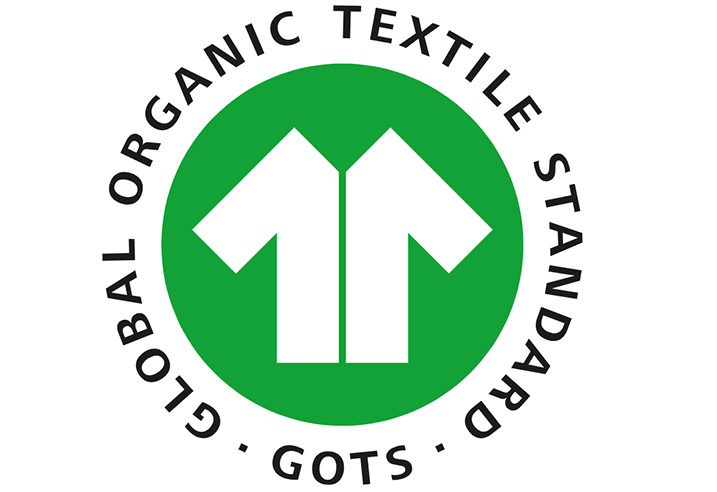
You’ve probably seen the label “GOTS certified” on a cotton shirt, a reusable tote, or maybe even a mattress. It looks official, so it must be quite important. But what does it actually mean for you, the buyer, or for your brand?
As more people shift toward sustainability, the question becomes: how do you know what’s truly organic and what’s just marketing? That’s where GOTS certification comes in.
Recognized worldwide, it’s one of the most trusted standards for organic textiles. Curious what GOTS really means, how it works, and why it matters from farm to final product? Let’s start with the basics.
What Does GOTS Stand For?
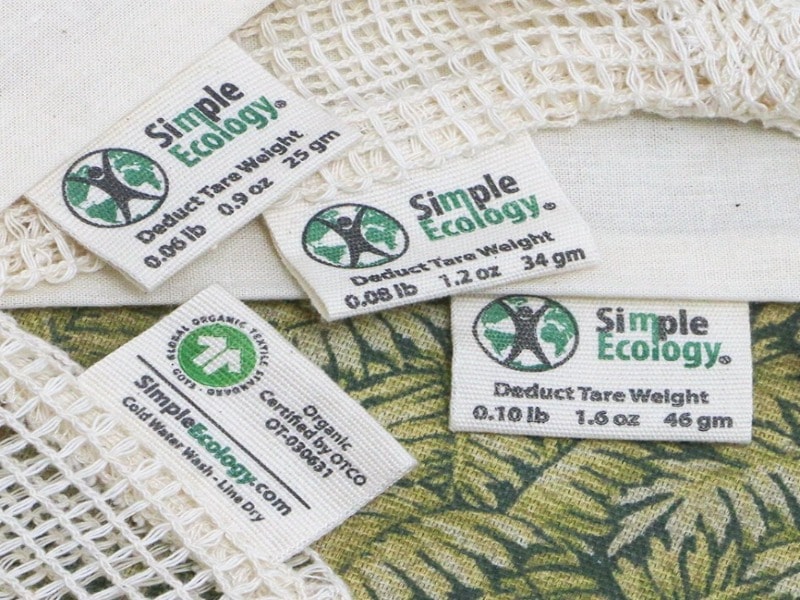
Some products are marketed as organic, but when you look closer, they don’t meet any sustainable standards. The fabric might be part organic, but the rest of the production process tells a different story.
GOTS stands for the Global Organic Textile Standard, and it’s one of the most trusted ways to check if a textile product is actually organic.
This standard doesn’t stop at the raw materials like organic cotton or organic wool. It looks at the entire production process, including how the fabric is made, what chemicals are used, how workers are treated, and how waste is managed.
To put it simply, GOTS checks whether a product is clean, safe, and fair from the ground up.
Here’s what it covers:
- Farming methods for organic fibers
- Safe processing (no toxic heavy metals or harsh dyes)
- Ethical labor (no child labor, fair pay, safe factories)
- Responsible packaging, labeling, and trading
If you’re sourcing textiles for your brand, choosing a mattress supplier, or comparing clothing manufacturers, GOTS helps you find companies that meet strong compliance and sustainability standards in the textile industry.
In other words, it’s your shortcut to filtering out greenwashing and finding certified organic products you can actually trust.
GOTS Certification Meaning and Criteria
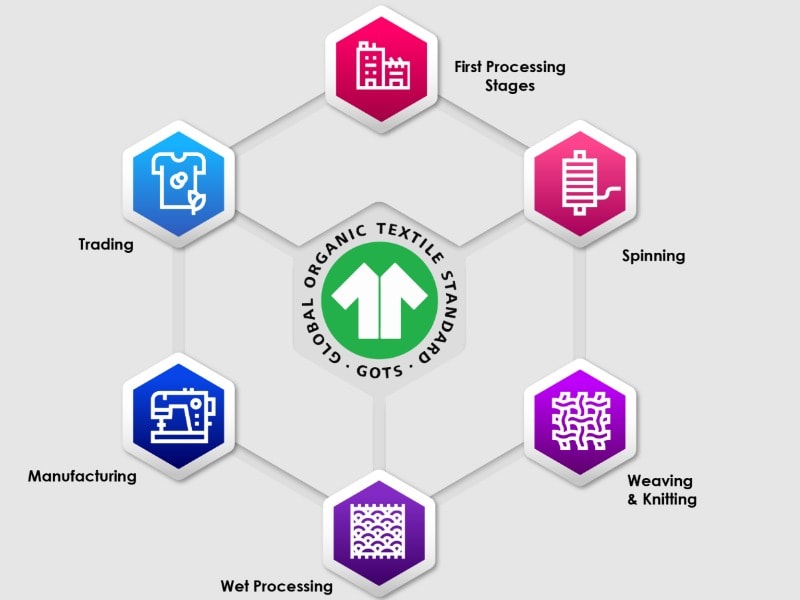
It’s one thing to say a product is organic. It’s another to prove it at every stage, from raw material to final label. That’s where GOTS certification draws the line.
To be GOTS certified, a product has to meet multiple criteria that cover not just what goes in, but how it’s made and who’s involved. It covers the entire production process.
Organic Fiber Content Comes First
For organic fiber content, at least 70% of the fibers must come from certified organic agriculture. If it hits 95%, it earns the higher-grade label, the kind you’ll see on premium organic cotton clothing or home textiles.
The Processing Has To Be Clean
GOTS prohibits toxic heavy metals, aromatic solvents, and harsh azo dyes, requiring safer, biodegradable alternatives. This is about protecting people and the planet.
Factories Must Treat Workers Fairly
You can’t call it ethical production if it harms the people who make it. The baseline is no child labor, no unsafe conditions, and pay that respects international labor rights.
Environmental Impact Is Measured
From wastewater treatment to chemical management, every step is tracked. Even the energy footprint and emissions from textile factories fall under the GOTS review.
Every Product Must Be Traceable
If a company claims GOTS, you should be able to follow the proof. The certification requires full traceability from the organic farm all the way to the final tag on your GOTS certified product.
What Products Can Be GOTS Certified?
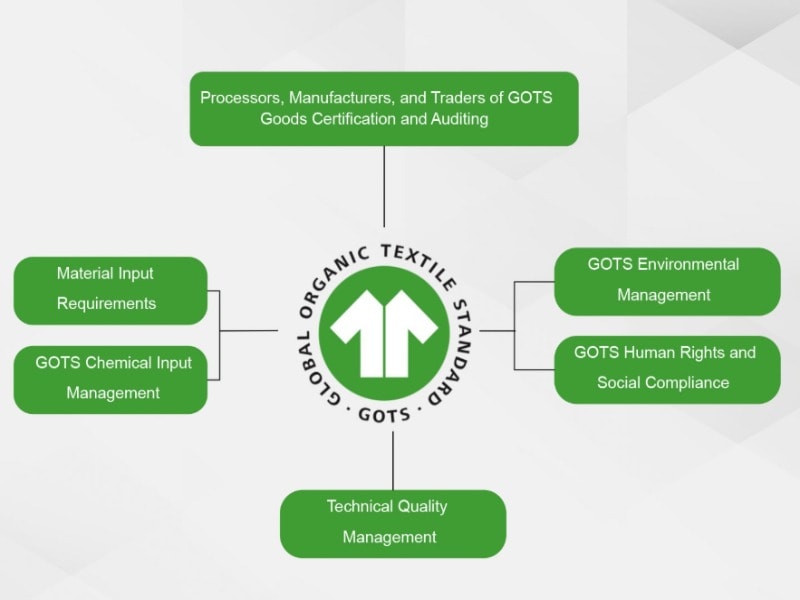
If it’s made from fabric, chances are it can be certified. That’s the simple way to look at it.
You’re not just buying a product. You’re buying the story behind it, one that starts on an organic farm and ends with a label you can trust.
Here’s where you’ll find GOTS showing up:
- Clothing and apparel, including jeans, cozy baby onesies
- Home textiles, like organic bedding, fluffy towels, or room-darkening curtains
- Reusable packaging, including cotton tote bags or jute sacks for products or gifts
- Personal care items, like washable wipes, face cloths, or menstrual pads
- Mattresses and their fillings, especially if you’re looking for a GOTS certified mattress, you can sleep on with peace of mind.
You’re not limited to high-end boutiques or niche eco stores either.
More suppliers and manufacturers are choosing GOTS as the baseline, which means these certified textiles are becoming more popular. And that makes the decision easier: when the label checks out, so does the product.
Why GOTS Certification Matters
Labels like “eco-friendly” or “natural” are easy to print but harder to prove. That’s where GOTS certification earns its weight.
For consumers, this means peace of mind. You’re not guessing if something is safe, fair, or genuinely organic. The GOTS label removes that grey area.
For brands and manufacturers, it’s a credibility booster as you’re not merely following marketing trends. It shows partners, suppliers, and customers that your process stands up to global standards.
And for the planet, it means less water wasted, fewer toxic chemicals, and better treatment for the people who actually manufacture GOTS products.
So whether you’re buying tote bags in bulk, sourcing organic fabrics from a factory, or choosing a certified mattress, GOTS helps you act with confidence and good intentions.
How To Identify GOTS-Certified Products
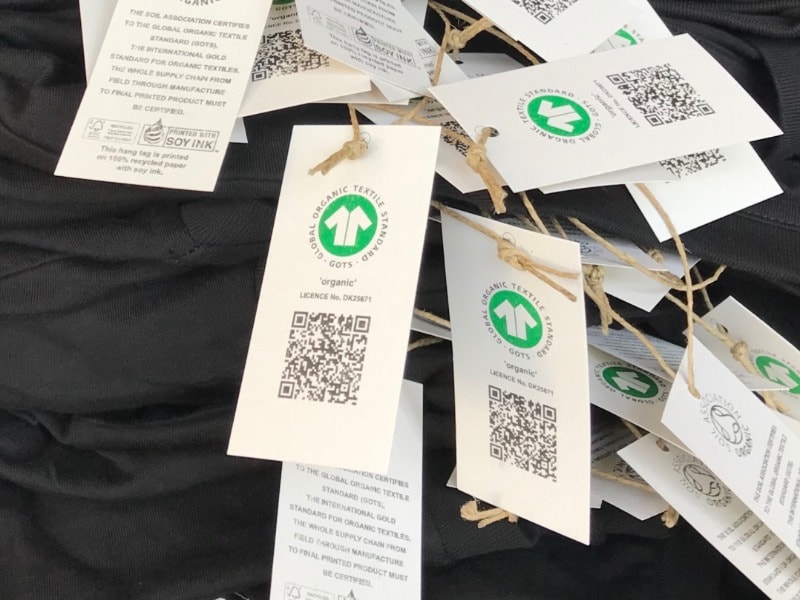
Greenwashing happens when brands use eco-friendly visuals or terms like “natural” to sound sustainable without following any global organic textile standards. It’s marketing dressed up as ethics, and it’s everywhere: tags, ads, websites, especially in textile manufacturing, where words are easier to manipulate.
To avoid falling for it, you need to know how real GOTS certification works. You just have to know what to look for.
Here’s how to verify a product’s claims:
- Start with the GOTS label, a green circle with a white shirt icon. This symbol confirms the product follows the full Global Organic Textile Standard.
- Check for a license number or the name of a certification body printed on the label. Every approved product must list one.
- Use the public GOTS database to confirm whether the producer or brand is certified. It’s the easiest way to filter verified organic textiles from clever branding.
- Be cautious of general claims like “eco” or “organic cotton” that aren’t backed by certification. Credible assurance comes with traceability.
GOTS doesn’t just support the use of organic agriculture; it verifies the entire production system: how raw materials are sourced, how people are treated, and how human health and the planet are protected throughout the supply chain.
If you’re sourcing responsibly, those small details matter. And the GOTS logo helps you support producers and partners who do things the right way.
FAQs
What does GOTS mean in clothing?
GOTS means the fabric isn’t labeled “organic”; it’s been checked all the way through. From how the cotton was grown to how the dyes were handled, GOTS certification looks at the full process. If it made it through, it’s safer, cleaner, and made more responsibly.
Is GOTS better than OEKO-TEX or Fair Trade?
GOTS is not better than OEKO-TEX or Fair Trade; it is just different. GOTS checks for organic content, chemical safety, and labor rights in one go. OEKO-TEX is more about chemical limits. Fair Trade is about how workers are treated. GOTS certification is a blend of both.
Can blended fabrics be GOTS certified?
Yes, but with limits. At least 70% of the material has to be certified organic. The rest can’t include anything such as toxic finishes or banned synthetics.
How do companies get GOTS certified?
Companies go through inspections. A third-party checks everything from raw organic fiber sourcing to what ends up on the label. If they pass, they keep getting audited every year.
Does GOTS cover packaging too?
Yes, GOTS covers packaging too. If the packaging touches a GOTS certified product, it has to follow rules such as no PVC, nothing toxic, and ideally recyclable or compostable. Even the box matters.
Wrapping Up
GOTS sets the benchmark for what sustainable and ethical textiles should be: transparent, safe, and fairly made.
Whether you’re sourcing organic cotton tote bags, apparel, or mattresses, the GOTS logo is more than a symbol. It offers credible assurance across the full chain, from organic agriculture to final production.
This certification doesn’t stop at raw materials. It holds manufacturing practices to high standards, protecting both human health and the people behind the product.
If you’re ready to source smarter, start with certified producers who meet the standard. The more we choose what’s verified, the more we support a system that actually moves the industry forward.
Source Certified Organic Textiles
Now that you know what GOTS certification really means, the next step is to use that knowledge in your sourcing decisions.
Want to ensure your products meet the highest sustainability standards? Choose GOTS-certified materials from verified suppliers.
Tendee is a GOTS-certified tote bag manufacturer and textile supplier based in China, supporting sustainable brands across the globe.
We work with certified fabrics and eco-responsible packaging to help you create goods that meet global compliance and customer expectations. Download our full catalog to explore certified textile options built for your brand.





